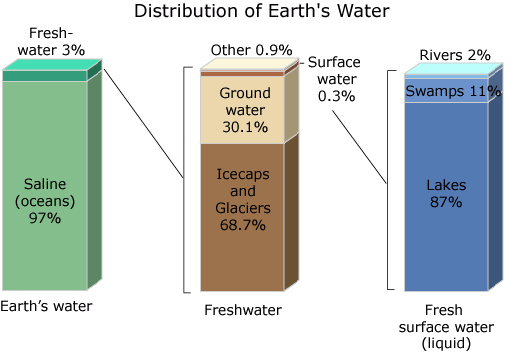I make water. Abracadabra
Question I get asked...
- What do you do for a living?
- Answer I give...
- I make water...
- Sometimes if I'm feeling a bit silly, the answer I give...
- I make dihydrogen monoxide...
- The look I get for either answer...
- Answer I give...

Source
The complete answer to what do I do...
- I am the Chief Water Plant operator in our small town.
Of course, I don't make water.
...people don't see the dot dot dot inferred after I say that...
The dot dot dot means it's only a partial answer.
I am a water plant operator.
- I make water safe to drink
- and pleasing to the eye and nose
- and non-corrosive to pipes and tanks
- in quantities required by the customers I provide
- including for use in emergencies like when there is a fire
- at a reasonable price.
- and pleasing to the eye and nose
About Water
About 71 percent of the Earth's surface is water-covered
- and the oceans hold about 96.5 percent of all Earth's water.

Source
I happen to work at a water plant that draws water from the ground.
- I have also worked at a water plant that draws water from lakes.
- I know people who work at a water plant that draws water from a river.
The average person in the United States uses 100-150 gallons of water a day.
How do we do all that other stuff?
We remove things from the water such as:
- suspended solids
- bacteria
- algae
- viruses
- fungi
- minerals such as iron, manganese and sulfur,
- other chemical pollutants such as fertilizers
Specifically, how do you do that?
This video is a good overview...
Water Plant Operators:
- Add chemicals, such as ammonia or chlorine, to disinfect water or other liquids
- Inspect equipment on a regular basis
- Monitor operating conditions, meters, and gauges
- Collect and test water samples
- Record meter and gauge readings and operational data
- Document and report test results to regulatory agencies
- Operate equipment to purify and clarify water
- Clean and maintain equipment, tanks, filter beds, and other work areas
- Follow U.S. Environmental Protection Agency (EPA) regulations
- Ensure safety standards are met
Source of this list: Bureau of Labor Statistics, U.S. Department of Labor, Occupational Outlook Handbook, Water and Wastewater Treatment Plant and System Operators, on the Internet at https://www.bls.gov/ooh/production/water-and-wastewater-treatment-plant-and-system-operators.htm
Tell me more...
I (@WizarDave) might add:
- We run a series of chemical tests on water
- before and after each process used in the water treatment plant.
- using the results to calculate adjustments to things like
- flow rates by turning on or off pumps
- chemical doses by adjusting chemical injection controls
Licensing in the United States
Workers at water treatment plants must be licensed by their State under the supervision of the US EPA (Environmental Protection Agency).
- OK, not all workers.
Only workers who make decisions to adjust things affecting any process in the plant.
There are various levels of licenses.
- In Missouri, they are A, B, C & D (entry level).
- You must pass a written test of 100 multiple choice questions.
- Then you must accumulate continuing hours of education every 3 years before you can renew your license.
- To advance up to C, B and then A
- You must accumulate additional years working at a water treatment plant
- You must pass a written test of 100 multiple choice questions.
Can I become a water treatment plant operator?
Quick Answer = Probably.
- Each little part of being a water plant operator is fairly straightforward and easy to learn.
- It can be a bit overwhelming when you look everything we do.
- New people usually attend a 8 week course (meeting 2 days / week for 8 weeks)
- We are given 2 large books to study out of.
- It can be a bit overwhelming when you look everything we do.
- And you are required to attend, take notes and study!
- You have to be able learn some chemistry and math.
- You do have to pass the test.
- Usually the plant you will be working at will help you by going over information you are struggling with.
- You have to be able learn some chemistry and math.
- There are even a lot of great YouTubes to help you learn the math, chemistry and other things.
Would I want to become a water plant operator?
When I attend a water conference, I look around and there are mostly older people.
- If you are younger, that gives you the advantage that a lot of us will be retiring before long.
- You might want to consider making this your career.
- If you are older, it's not a real physical job.
- You might want to consider making this your career until you retire.
There are water plants all around the country and even the world.
- You can pretty much pick where you want to live.
- It may take awhile for a position to come open in the exact location you want,
- but you can usually get close.
- It may take awhile for a position to come open in the exact location you want,
Things I personally like about being a water plant operator.
- I usually work alone.
- It's challenging enough to keep me from being bored.
- I have multi-tasking brain, so I as am doing my duties, I am thinking about my next post on Steemit...
- It's challenging enough to keep me from being bored.
Some things to consider:
- You might be asked to work any shift during the day.
- You might have to work at least some weekends.
- In small towns, you might have to also be the wastewater operator.
Or work with the distribution crew maintaining and repairing the pipes connecting to customers.
- In small towns, you might have to also be the wastewater operator.
- You might have to work at least some weekends.
- Benefits are pretty good.
- I get paid health insurance and a retirement plan.
- I get to attend a conference once a year at a Lake of the Ozarks resort.
And attend 1 or 2 additional classes around the area each year.
- I get to attend a conference once a year at a Lake of the Ozarks resort.
- I get paid health insurance and a retirement plan.
How's the pay?
In the US,
- average pay in 2016 was $45,760 per year or $22.00 per hour
- There were 119,200 jobs in 2016
Random thoughts
Drinking bottled water is NOT necessarily better than tap water.
- It is unregulated.
- A lot of bottlers use tap water.
Perhaps the biggest gain the world has made regarding health was installing sewer systems.
- Perhaps the next biggest gain was building water treatment plants to disinfect water.
- I've seen many different studies and these 2 are always at or near the top.
You should be concerned if your local plant adds fluoride to the water.
- Here's a pretty thorough post about why.
- Scroll and you can read my comment.
- Fluoride is especially dangerous for those < 2 years old!!!
- The main problem is they are giving a medicine to everyone without being able to establish the dose everyone gets.
- The biggest organ of your body is your skin.
- When you shower you are absorbing fluoride.
- The biggest organ of your body is your skin.
I get to ask the last question of you...
Did you find this article informative?
- If so, please upvote and resteem if you would like...
OK here's the real last question...
If the earth is
71 percent water
and only 29 percent land
doesn't that mean
we should spend WAY MORE time fishing
than mowing the yard!?!?!?
Oops I almost forgot!
- dihydrogen monoxide = H2O
- LOL

I imagine you would have interesting comments about adding fluoride and chlorine to the water.
Sorry, I just now saw your comment @kansuze.
I was raised near Stratford, Ontario which was part of a tri-city Canadian study that initially convinced them to add fluoride to the water. I think it was studying cavities. The city gets its water from artesian springs that contain a different type of fluoride, and after the study, they added more! And my dentist was completely against it, calling fluoride rat poison in higher quantities. I know in recent years the provincial guidelines reduced the amount required in the water but they haven't cut it out completely.
In the last decade or so, our province switched to a different type of chlorine in the water supply. You could smell the first type when you took a shower but this new type requires the owners of tropical fish to put drops in the water to get rid of it. Do you know anything about these different types and why they might have switched?
The fluoride studies were definitely tainted in my eyes. They say all dentists believe it is a good thing. That's false. The biggest problem I see is they never asked MD's. The US EPA limit is 4 mg/l. But only 2 mg/L for children under the age of 2. Most water plants dosed for 1.0-1.2 mg/L and many have dropped that to 0.8 mg/L, simply to save a bit of money and since there is no actual scientific studies that the additional dose would help anything. There is no way anyone could ever figure out the actual dose people are getting. That would depend on how much water they drink and cook with and how much showering they do. There is no MD who would honestly recommend dosing people with an unknown amount of a chemical that has been proven to lower IQ's in children. Yes, nearly all groundwater contains some fluoride. Here we have about 0.2 mg/L natural fluoride. Another water plant I worked at about 30 miles from here had about 0.4 mg/L. There is one water plant in southern Missouri I know of that natural water exceeds the 4.0 limit, so they have to dilute it with other water that is lower than that.
They probably switched to chloramine disinfection. Which is simply adding ammonia to the water. It's not quite as good a disinfectant as free chlorine, but it does last longer. People who are on dialysis have to be aware when they switch to this. The main push to switch is because of disinfection byproducts created from the reaction of chlorine to organics. These disinfection byproducts have proven to cause cancer. But, before you through the baby out with the bathwater (haha I think I made a pun), chlorine does way more good than harm. People's health is improved because disease and parasites are nearly non-existent after disinfection. They are now talking about regulating the disinfection byproducts from chloramines, because 1 in a trillion people might get cancer from it. That's just ridiculous odds and the huge cost of regulations would not be worth it.
And they still added fluoride! Health Canada considers 0.7 milligram/litres to be optimal. Fluoride and drinking water from the Perth Country district health unit.
That's crazy. Make sure young kids don't drink this!
Stratford alone has a population over 30,000. They have been drinking the water since the area was settled.